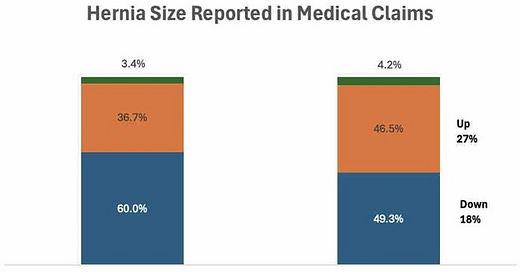1. Promising mRNA vaccine protects against norovirus
Norovirus, the “GI bug” which leads to severe nausea and vomiting, has made this winter miserable for many. Preliminary data shows about three times as many outbreaks this winter compared to last year, perhaps because people have little immunity to a new strain. The good news is that Moderna has moved into a Phase 3 trial for an mRNA vaccine against norovirus. The exceptionally harsh season makes it more likely that the study will be able to identify statistically significant protection this year, and if the trial is concluded based on this season’s results, the vaccine could be approved for the 2026-2027 winter season. In the meantime, washing hands (for 20 seconds with soap, not alcohol) and careful food handling is the best protection.
2. Hernias got bigger after payment changes
Source: Hallway, et al JAMA January 16, 2025
It’s hard to measure the size of hernias. But when Medicare introduced an incentive for a hernia to be larger - surgeons responded by billing for removal of larger hernias. The Centers for Medicare and Medicaid Services started paying more for hernias that are over 3 cm (about 1½ inches) in 2023, and researchers in JAMA demonstrated that providers billed for substantially more of the larger hernias than they had in 2022. This made them eligible for higher payment. We should expect this, as people naturally interpret rules in ways which lead to their advantage.
3. Two new studies support sweetened beverage taxes
We know that drinks sweetened with sugar or corn syrup lead to weight gain and are associated with metabolic syndrome and diabetes. Decreasing consumption of sweetened beverages could improve health. I reported last month on a disappointing study that showed that the Philadelphia soda tax did not lead to decreases in pediatric obesity. Since then, two new studies support the use of taxes on sweetened beverages to improve public health.
Kaiser Permanente found a statistically significant decrease in BMI in adults in four California cities that enacted soda taxes of a penny per ounce of sugar sweetened beverage. This was a large study (over 100,000 people) published in JAMA Network Open. Another study published earlier in January in JAMA Health Forum included communities in California, Washington state, Pennsylvania and Colorado which implemented sugar sweetened beverage taxes, and found that these taxes increased prices by about 33% and decreased consumption by about the same amount. Some consumers might have chosen to purchase less expensive soda in neighboring communities without a tax. These studies are promising, in that preventing obesity and associated metabolic diseases is far better than treating them when they are established.
4. More thyroid cancers found in those in GLP-1s because clinicians look for it
GLP-1 drugs have black box warnings that they might increase the risk of thyroid cancer, and they are not indicated in those with a personal or family history of medullary cancer. However, a large study done by the Veterans Administration that I covered last week failed to find any correlation.
Researchers in JAMA ENT evaluated thyroid cancer incidence in a population of over 350,000 people with diabetes who were treated with one of three types of diabetes medication over a six-year period. They found a higher incidence of thyroid cancers discovered in those treated with GLP-1 medication for the first five years, and then a lower incidence thereafter. They also found a statistically significantly higher rate of thyroid ultrasounds in patients who were prescribed GLP-1 medications. The authors concluded that more thyroid cancers were diagnosed because clinicians were performing more diagnostic testing in those who were prescribed GLP-1s, likely due to the black box warning on drug labels for these medications. Small papillary cancers are often overdiagnosed - as happened in South Korea when there was a large effort to screen young women which led to far more cases and no change in mortality. Here’s a link to an earlier post on this subject.
5. FDA approves Ozempic to prevent kidney disease progression in diabetes
The Food and Drug Administration (FDA) approved Ozempic for prevention of progression of kidney disease in people with diabetes last week. Semaglutide, the active ingredient of Ozempic and Wegovy, was associated with a 24% decrease in adverse kidney outcomes in a large randomized trial published last year. Since almost all employer-sponsored health plans already cover GLP-1 medications for diabetes, this approval will have little impact on employer-sponsored health plan design. This approval could lead more physicians to prescribe GLP-1 drugs for treatment of diabetes.



